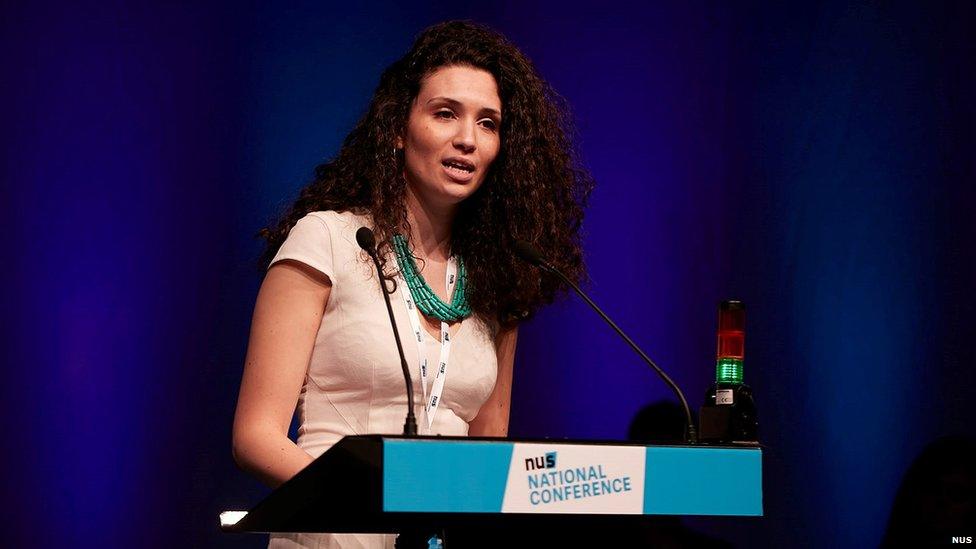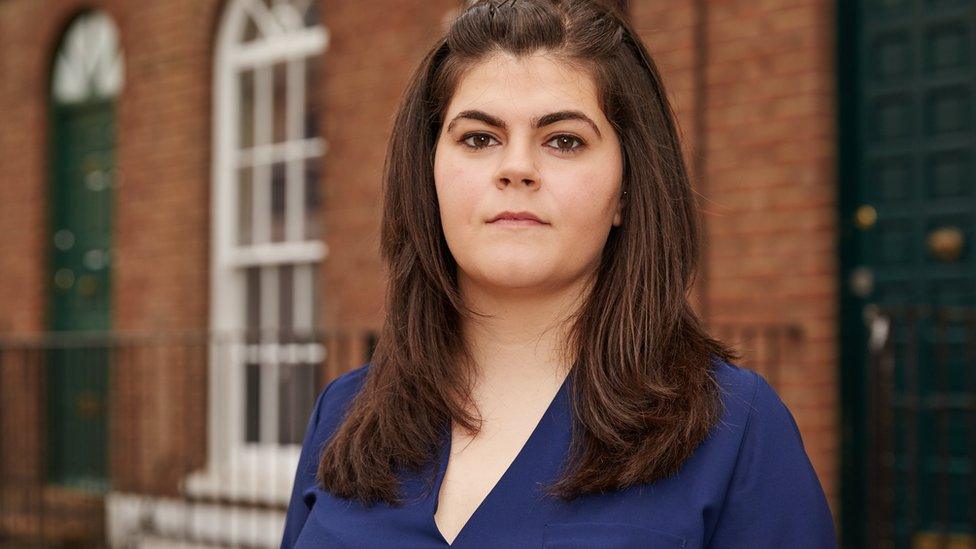Is the NUS on the verge of breaking up?
- Published

A growing number of universities want to vote on whether to split from the National Union of Students (NUS).
Some student groups are unhappy with the views of the union's new president, Malia Bouattia.
She's been called "racist" and "provocative" towards Jewish people and been accused of condoning so-called Islamic State.
Cambridge had just enough votes to remain in the NUS but other universities have said goodbye.
In response to the pro-IS claims, Ms Bouattia says she simply disagreed with the wording on a motion on the group as it was "Islamaphobic".
She argues on other matters she's been misunderstood and says she stands for all students.

Malia Bouattia
What's all the fuss about?
Malia Bouattia became the first black, Muslim NUS president in April.
Her appointment was controversial because comments she made, which agreed with a violent struggle in parts of the Middle East and other claims of anti-Semitism.
Ms Bouattia was the co-author of an article describing Birmingham University as "something of a Zionist outpost".
Zionism, put simply, is believing in the right of the state of Israel to exist.
It's triggered individual student unions to vote on whether they still want to be represented by the NUS as a national body.
Hull announced recently it would be leaving the NUS, external
Which universities are involved?
Cambridge students were the latest to be asked the question, while Oxford will decide next week.
Students at Lincoln, Hull and Newcastle have voted in the last few weeks to leave.
Exeter, Surrey and Warwick voted to remain.
There are many more votes coming up in places such as Worcester, Loughborough and York.

Some local student unions want the NUS to get back to core issues
How was Malia Bouattia voted in?
NUS leaders are elected through votes of delegates invited to the NUS conference.
She won by a margin of 44 votes in April.
She beat former president Megan Dunn, who was fighting for a second term.
Individual student unions want the leader elections opened up to more people from across the country.
One of her most popular manifesto pledges was against Prevent, the government's anti-extremism programme.
UK laws mean students, who teachers believe are at risk of radicalisation, have to be referred to Prevent.
Malia Bouattia won the job, despite an open letter from almost 50 Jewish student leaders, who said they were "extremely concerned" by her views.
They argued there was already rising extremism and anti-Semitism at universities.
Why break away?
The NUS has the job of standing up for students rights on issues such as teaching, fees and accommodation.
Some, like its former president, the Labour MP Wes Streeting, feel like the NUS has lost its way.
Others believe it has lost touch with mainstream students and focuses on politics rather than helping the people it was set up to serve.

Megan Dunn hoped to stay on in the role of NUS president
What could this mean for the NUS?
The NUS could lose hundreds of thousands of pounds in membership fees.
That could mean a funding crisis if more universities decide to leave.
The organisation also gets a lot of its cash from commercial revenues and has links with sites like Apple and Amazon.
Megan Dunn admitted she was disappointed to see Hull leave this week:
"Disaffiliating means breaking up the national movement," she said.
"It will disadvantage Hull students and undermine the position of Hull University Union, NUS and student unions across the country."
What's Malia Bouattia had to say?
We've been trying to get hold of her.
She doesn't take up her position until next month but has written an article for The Guardian, external.
She says it's unfair how she's been portrayed and questioned if it's because of her race and religion instead of her views.
She argues the comments about IS have been taken out of context, as the NUS motion was poorly written.
"Its language appeared to condemn all Muslims, not just the terror group," she wrote.
"Once it was worded correctly, I proposed and wholly supported the motion."
Find us on Instagram at BBCNewsbeat, external and follow us on Snapchat, search for bbc_newsbeat